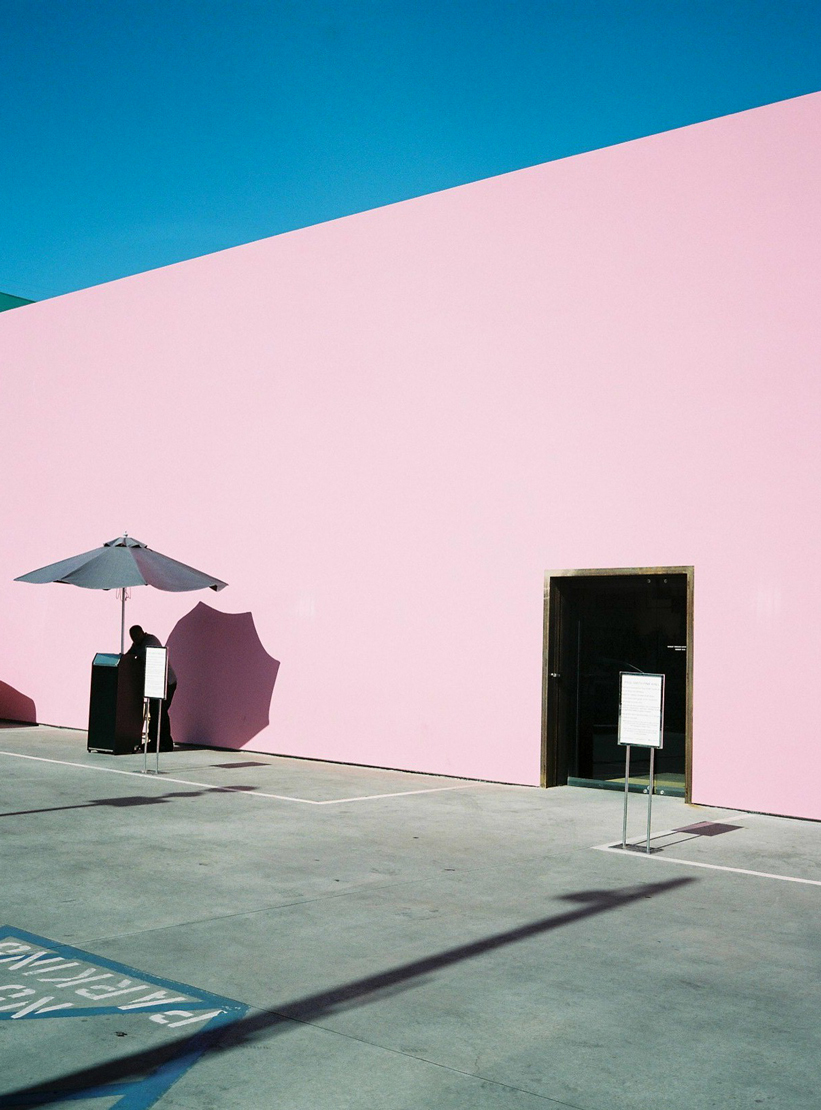The grit and glamour of L.A.'s cinematic streets
- Text by Cian Traynor
- Photography by Julian Caldwell

Julian Caldwell had a pretty fixed idea of what to expect from the city of his dreams: Cadillacs, palm trees and picture-perfect sunsets.
The 19-year-old British photographer saved enough money to spend a week there on a solo visit: half of that time changing bed sheets in youth hostels, half of it hitting the streets with a camera in hand.


“It’s a place almost everyone feels familiar with on some level, from memories of films growing up or the music they listen to now,” he says.
“You quickly get the sense, however, that locals have to deal with this constant stream of visitors all searching for the stereotypical signifiers of the city, skimming over anything that doesn’t sit within their preconceived version.”
Those things were hard to miss: the luxury tour buses taking people on tours of celebrities’ homes, the trash cans brimming with discarded smoothies, the gleaming sports cars parked outside designer boutiques.



But as Julian drifted off the tourist trail, he found an unforgiving place wary of cameras. It was there that someone pulled him aside and told him to be careful of what he shot, that one day those images might come back to haunt him.
“I feared that this is what everyone there viewed me as: a wealthy, white infiltrator whose only purpose was to humiliate or expose the community,” he says.
In reality, Julian had effectively been preparing for this moment for years.


He’d been keep a photo blog since the age of 15, cultivating pictures of L.A. that helped train his eye for colour and design. “Embarrassing in retrospect, but I think this definitely honed an awareness of composition,” he says.
Recognising his own intentions – to respectfully capture how L.A.’s affluent and deprived co-exist – Julian felt flustered but undaunted by that encounter on the street.
“I was so blown away by the sheer volume of homelessness there, which was on another level to anywhere else I’ve ever been, that to not put some focus on it would’ve been skimming over a massive component to the city,” he says.



As Julian spent more time in neighbourhoods south of the city, he thought of his portraits as a gesture of recognition: a way to acknowledge the quiet dignity of those hustling to survive.
“You’d often see tarps spread out on the street with an array of random items for sale or trade, from battered old shoes to near-mint condition Air Jordans, and sometimes people would ask to have their picture taken,” says Julian, who’s from Bristol but is about to move to London for an internship in radio production.
“Interactions with these characters that reminded me how photographing a downtrodden community does not imply humiliation, and can in fact do a lot to reveal a spirit and warmth that often goes overlooked.”



“This man asked that I send prints of the photos to an address of a friend, as it had been years since someone took his photo.”
By contrast, the thing that struck Julian about LA’s prosperous neighbourhoods was just how closed-off they felt – all big cars, big houses, big dogs and big fences.
Any glimpses of that side of life felt fleeting and detached.



“Even still, I think the best photos are always the ones you feel uncomfortable, rushed or unsure taking,” he says.
“I had gone out there with the aim of simply following my nose, shooting whatever I found to be bizarre or interesting – which turned out to be almost everything.
“Despite the extreme disparity between poverty and wealth, the unpretentious and the fairytale facade, what will stick with me is the energy I found somewhere in the middle.”


Check out Julian Caldwell’s project, Street Files LA.
Enjoyed this article? Like Huck on Facebook or follow us on Twitter.
Latest on Huck

In the ’60s and ’70s, Greenwich Village was the musical heart of New York
Talkin’ Greenwich Village — Author David Browne’s new book takes readers into the neighbourhood’s creative heyday, where a generation of artists and poets including Bob Dylan, Billie Holliday and Dave Van Ronk cut their teeth.
Written by: Cyna Mirzai

How Labour Activism changed the landscape of post-war USA
American Job — A new exhibition revisits over 70 years of working class solidarity and struggle, its radical legacy, and the central role of photography throughout.
Written by: Miss Rosen

Analogue Appreciation: Emma-Jean Thackray
Weirdo — In an ever more digital, online world, we ask our favourite artists about their most cherished pieces of physical culture. Today, multi-instrumentalist and Brownswood affiliate Emma-Jean Thackray.
Written by: Emma-Jean Thackray

Meet the shop cats of Hong Kong’s Sheung Wan district
Feline good — Traditionally adopted to keep away rats from expensive produce, the feline guardians have become part of the central neighbourhood’s fabric. Erica’s online series captures the local celebrities.
Written by: Isaac Muk

How trans rights activism and sex workers’ solidarity emerged in the ’70s and ’80s
Shoulder to Shoulder — In this extract from writer Jake Hall’s new book, which deep dives into the history of queer activism and coalition, they explore how anti-TERF and anti-SWERF campaigning developed from the same cloth.
Written by: Jake Hall

A behind the scenes look at the atomic wedgie community
Stretched out — Benjamin Fredrickson’s new project and photobook ‘Wedgies’ queers a time-old bullying act by exploring its erotic, extreme potential.
Written by: Isaac Muk